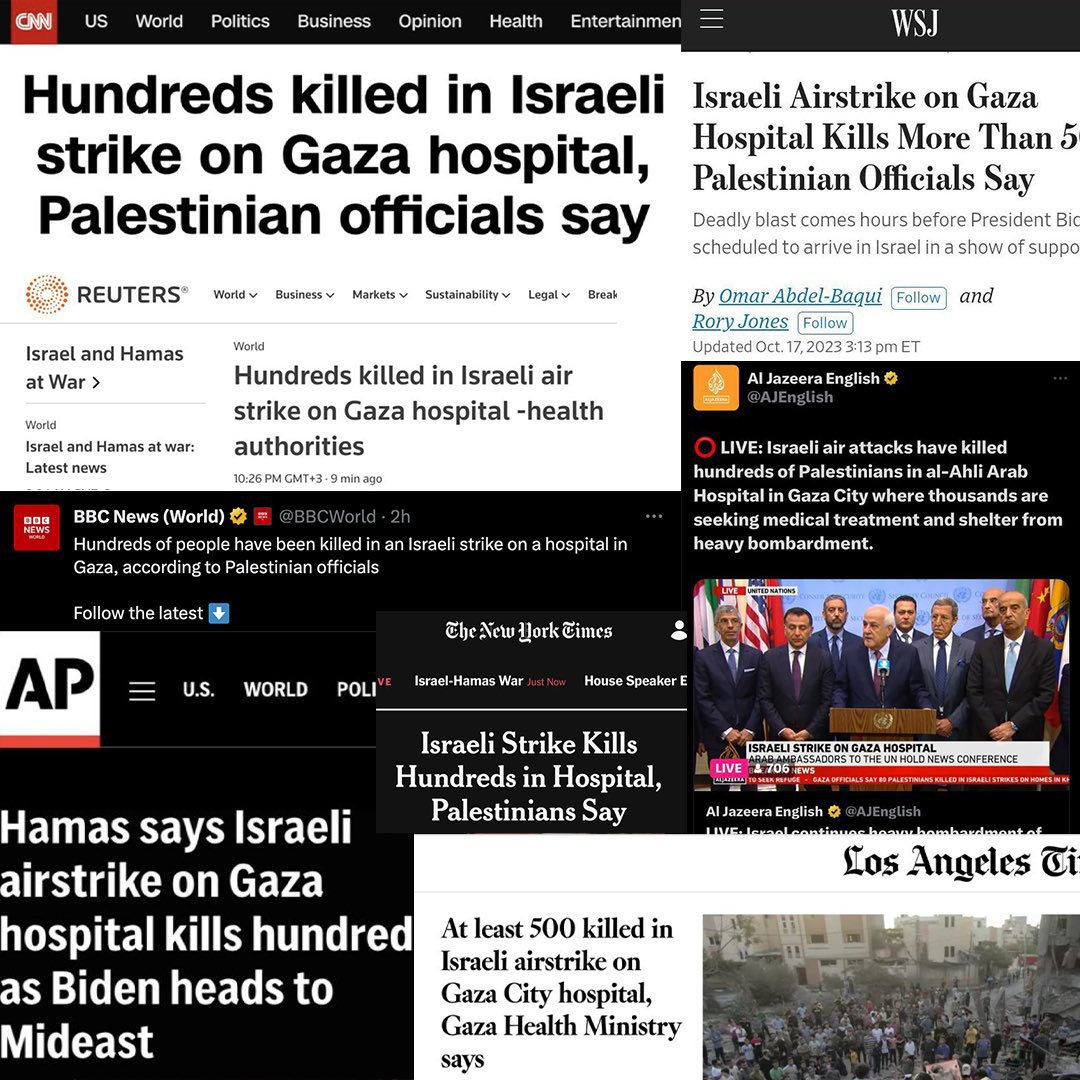I typically write issues on Saturdays and publish them on Sundays. This week, as you might imagine, things are a bit different. You’ll still get an issue on Sunday, don’t fret; but, this particular story demanded to be written and published immediately.
Also, I’m incredibly honored to have this story be syndicated on katiecouric.com, and am thankful for the support of Katie and her team at KCM. The story is currently live on their website, and will be featured in this morning’s edition of Wake-Up Call, Katie’s daily morning newsletter.
They say that in war, the first casualty is the truth. But whether Aeschylus (~500 BC) or Hiram Johnson (1917) was the first to fully say it, neither lived to see the rise of digital news and social media. If war destroys truth, today’s media environment makes the destruction much faster and more dangerous. And with the coverage of the blast at the Al-Ahli hospital in Gaza City this past Tuesday, the world got a firsthand look at just how fast and dangerous that environment can be.
I’ll summarize briefly: Tuesday evening (local time), a hospital in Gaza City was hit by some kind of projectile, with devastating effect. A large portion of the building was reduced to rubble, and hundreds of Palestinian civilians were injured or killed. Israel’s been conducting a bombardment campaign against targets in Gaza, and so one might have expected Hamas and others to accuse Israel of destroying—and even targeting—the hospital. Of course, Hamas and the PIJ have been launching rockets from Gaza into Israel, and one might also have expected Israel to accuse Hamas / PIJ of causing the blast vis-a-vis a failed rocket attack. Here’s the vital part: absent actual evidence, it would have been irresponsible for media outlets to voice either side.
But that didn’t stop them from doing so.

Here’s the source for the above image, which shows various headlines / posts clipped from sources like CNN, the AP, WSJ, and Al Jazeera. I saw these headlines in the hours after the blast and took note, though I wasn’t prescient enough to clip them myself and they’ve now mostly been “updated.” (Others were so prescient, though, and I’m thankful for their efforts.)
So, what do we see? From Al Jazeera, it’s an unconditional buy-in to the Hamas narrative that the blast was caused by Israel. To be fair, I remember Al Jazeera’s coverage on 9/11/2001, so I’m not entirely surprised here. It’s irresponsible journalism, but that’s also their MO. It’s the headlines written by the other outlets that are more cause for concern. Sure, their headlines include qualifiers like “Palestinian officials say,” or “Gaza Health Ministry says,” but is just slotting that in at the end doing enough in the way of responsible journalism?
There’s two separate stories here:
A blast occurred at a hospital in Gaza, injuring and killing civilians; and
Palestinian officials blame Israel for causing the blast.
At time of publication, the stories weren’t equally substantiated. The first story was fairly well evidenced. There were videos, photographs, witness accounts, etc. However, the second story was evidenced only to the extent that the allegations were made, and not in any way with respect to the veracity of those allegations. Reporting on allegations regardless of how true they are? Who does that? (Answer: Tabloids.)
It would have been easy enough to write a headline based on proven facts, and maybe included discussion of the allegation in the body of the article. But it should be the facts that drive a story, not unproven allegations. So why include, and moreover, highlight, the allegation in the headline? Simple: click-bait pays the bills.
But unlike the “5 Weird Facts Your Doctor Doesn’t Want You To Know” flavor of click-bait, the kind we’re discussing here has real-world consequences. We’ve theorized before that at least part of the rationale behind the Hamas terror attacks was the destabilization of the normalization process for relations between Israel and a number of countries in the Arab world (including, among others, Saudi Arabia). And Israel striking a hospital full of Palestinian civilians? If you’re Hamas or its backers (Iran), this couldn’t have worked out better.
Except, as of roughly a day later, it was demonstrated on the basis of not insubstantial evidence that the blast at the Gaza hospital was not caused by Israeli missile. Whoops!
It’s important to note that the Israeli government denied involvement from the beginning. Two things:
That’s what we’d expect them to say, regardless of whether they were actually involved; and
The denial never made it into any of the headlines; only the Palestinian accusation did.
But, if the referenced media outlets chose not to include the Israeli denial in their headlines because “that’s what we’d expect them to say,” why include the Palestinian accusation? Isn’t that also “what we’d expect them to say?” For what it’s worth, my view isn’t for longer headlines; it’s that responsible wartime journalism sticks to the facts, and doesn’t deal in unsubstantiated allegations and denials.
Now, however, we do have substantiation.
There’s three broad categories of publicly available evidence here:
The real-time video footage more or less speaks for itself. It was available pretty early on, and shows fairly clearly what looks like a rocket flying along, stopping when there’s a flame mid-air, then sort of nothing for a bit, and then a big explosion on the ground. This tracks with the narrative of a rocket malfunction, and based on the trajectory, the projectile was headed out of Gaza, not into it.
With the audio intercept, it’s pretty clear in its meaning, but there’s a big issue of veracity; that is to say, it could be real, or it could be faked. The thing is, it’s not really possible to verify without disclosing the sources and methods of the intelligence collection, and in the intelligence business, sources and methods are among the most heavily guarded secrets. On one hand, disclosing how this audio was obtained might well vitiate the ability to intercept more (and ideally, more important) audio communications. Nevertheless, if the audio is real, Hamas knows who’s talking to whom on it, as well as via what means, and they might well alter their protocols in response, so…the bulk of the harm’s been done? It’s tough to say.
On the overhead imagery piece, we’re looking at the specific markers of the damage caused at the blast site and comparing that to what typical damage markers are for various types of projectiles. There’s various informative points here, but the most interesting, to me, is the lack of a significant impact crater. The “Qassam rockets” being fired from Gaza are much more rudimentary than even the smaller Israeli munitions (e.g., a 500 lb. JDAM), and the argument with respect to this category of evidence is that something out of Israel would have left a markedly different, and larger, damage signature. I’m hardly the right person to evaluate this sort of claim, but I do trust the work of Bellingcat, which supports the proposition that the damage signature here isn’t a match for an Israeli JDAM.
(For a good summary of the evidence, have a look at this article from The Independent.)
But the point here isn’t whether the evidence is or isn’t convincing to me. It’s about whether this evidence should have been reviewed and analyzed by media outlets (using personnel presumably employed or contracted for exactly this purpose) prior to publishing misleading headlines. That would’ve been responsible journalism, and what we got was far less.
So, what now? As you might expect, the headlines have mostly been changed. “Updated,” one might say, in light of some actual evidence. (The joys of digital media.) CNN published a semi-admonition of “news outlets in [the] fog of war,” which is an interesting take for them. Across the pond, the BBC is getting dragged. And all around, there’s a predictable lack of mea culpas, presumably because they’re no fun to write.
But the damage has already been done. Across the Middle East, there’ve been public demonstrations and other displays of outrage at the incident and Israel’s alleged culpability. The leaders of several countries in the region have issued statements condemning Israel and repeating the allegations of its responsibility for the blast at the hospital. The regional summit between President Biden and the leaders of Jordan, Egypt and the Palestinian Authority has been cancelled. And as for the Hamas (and Iranian) objective of disrupting the normalization of relations between Israel and its neighbors? The “W” couldn’t be drawn big enough.
One might argue that this would’ve happened anyway, as coverage from the region’s more popular media outlets (e.g., Al Jazeera and Al Arabiya) would’ve stoked the flames regardless. But that’s not good enough; journalism shouldn’t be a race to the bottom.
In the competitive market for clicks, though, it sometimes may as well be.

